ICE COLD HAS ONLY APPLIED TO THE COLD STORE OF A REAL FAMILY BUSINESS SINCE 1973
More than 45 years after its start, the Frigo Group is still a real family business, with Margreet van Elderen as Managing Director and owner. The founder is her father Hein van Elderen (1934), a progressive farmer. Entrepreneurial, energetic, socially-motivated, inspiring and enthusiastic are other characteristics that apply to him. Many characteristics of the unique Frigo philosophy or mission can be traced back to him. And: there is no such thing as can’t.
As a celeriac grower, Van Elderen decided to build a cold store in Nieuw-Vennep in 1973. With this step from agriculture to the storage of chilled and frozen foodstuffs, he laid the foundations for the Frigo Group, which rests on three pillars: Frigo Nieuw-Vennep cold store (22,000 pallet locations), Frigo Group Logistics and Frigo Group Transport.
Ice cold and yet warm… As befits a family business, the Frigo Group still considers personal contact to be of paramount importance. The flat organisation with just one management layer allows customers to have direct contact with the ‘decision makers’. They have insight into the activities and are aware of the specific requirements that apply to the storage and handling of your goods.
The Frigo Group pursues long-term customer relationships. The personal contact and added value that we offer guarantee this. Some clients have been using our services since 1973. The Frigo Group has become a natural part of their supply chain. Our employees, too, tend to have a long association with us. This is good for our customers: they always have contact with the same people who know their specific customer requirements like no other.
As the Frigo Group, we are proud of our past, precisely because it laid the foundations for the present and future. Based on important dates in our company’s history, you will find below a historical overview characterised by entrepreneurship, quality, pride and an unshakeable confidence in the future.
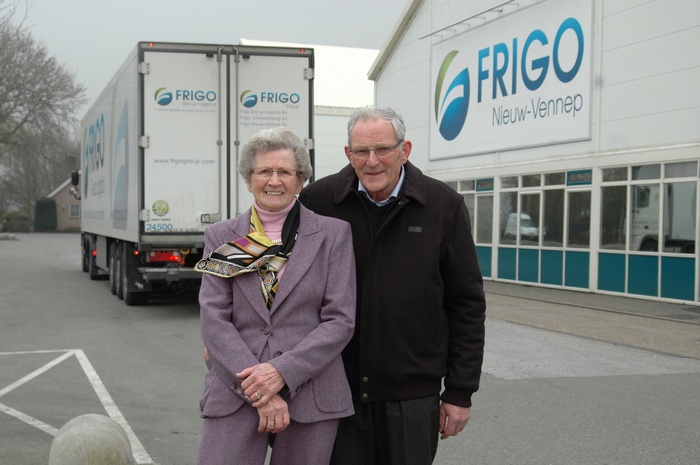
1934
Hein van Elderen is born in Haarlemmermeer in a family of ten children. His father is a farmer in Rijsenhout. He leased 40 hectares of land and grew potatoes, beets and wheat, among other things. After primary school, Hein could not continue his studies, but had to work on his parents’ farm. At that time horse and cart still played an important role in agriculture and horticulture (photo below). From the age of eighteen he attended the Secondary Agricultural School in Hoofddorp in several consecutive winters. He passes with excellent marks, as one of the best in his year.
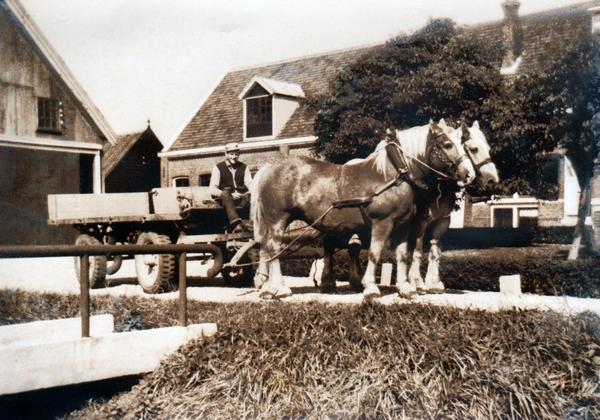
1964
Hein van Elderen marries Ank Parlevliet at the age of 29. For all the years he worked for his father, he receives a starting capital of 14,000 guilders. The couple started their own arable farm, also on leased land on the IJweg in Nieuw-Vennep. When a few years later the sugar beet crop threatened to fail due to excessive rainfall, Van Elderen introduced red beet and celeriac in the cultivation plan. The alternatives are so successful that he steadily expands both crops, renting more and more land. Innovative as Van Elderen is, he is increasingly mechanising the cultivation and processing of beetroot and celeriac in collaboration with Wageningen Agricultural University (see photo below). Despite such innovations, many hands are needed. Neighbours and relatives help and share in the success. Van Elderen: “You shouldn’t want to keep everything to yourself but allow others to do their bit as well. Then they’ll help you when you need it.
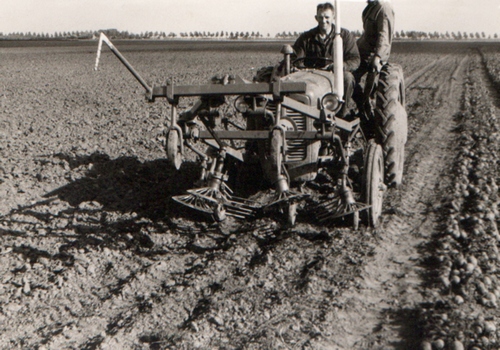
1972
Van Elderen doesn’t like the fact that he can’t keep celeriac, and therefore has to sell it, when it can no longer be stored. He buys two hectares of land on the other side of the IJweg and builds a cold store. He did it himself, because Van Elderen is convinced he can do it more efficiently than a contractor. “By doing it myself, with my own construction team, I save at least twenty per cent on the total construction costs. That’s why I always win over my competitors. What’s more, the end result meets my wishes one hundred per cent. The left photo shows Van Elderen (far right) and three employees, standing alone in the rafters of the future cold store. In the right-hand photo the founder of the Frigo Group poses with his daughters Wil and Margreet in the cold store under construction.
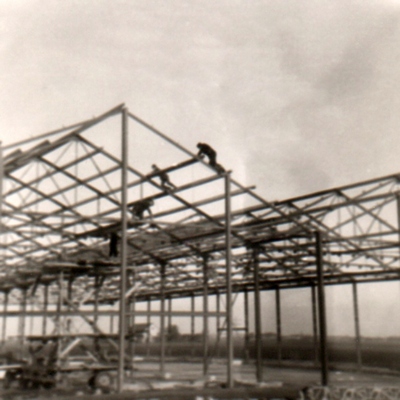
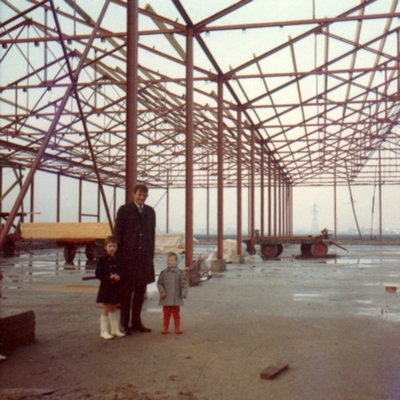
1973
The cold store in Nieuw-Vennep is taken into use. Initially mainly intended for the storage of celeriac, it has a capacity of approximately 16,800 m3. The number of employees at Van Elderen grows steadily. Staff turnover is very low. “You have to treat an employee the same way you want to be treated,” says Van Elderen. The photo shows how busy it is on the IJweg when the harvesting and processing of celeriac coincides with the unloading of one truck after another.
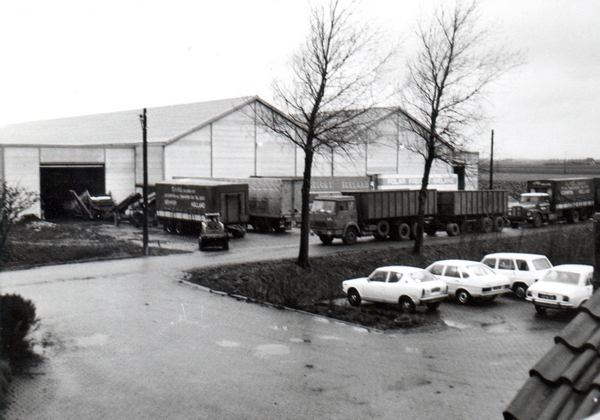
1974
There is a huge surplus of beef in Ireland, which the European Union is removing from the market and freezing. A lorry driver tells Van Elderen about it. He acts quickly and travels to Ireland, where his wife does the talking as he does not speak English herself. In the early spring of 1974 the first lorry from Ireland turns onto the IJweg, loaded with cow legs. The photo below shows that many more will follow…
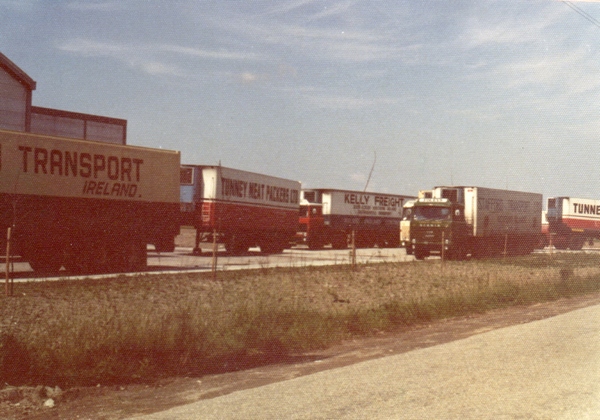
From Easter 1974 the cold store in Nieuw-Vennep is filled with Irish beef. For the Van Elderen’s as well as for the employees it is a struggle, because the loading is manual and the ‘cow legs’ are extremely heavy (see pictures below). Later, the couple’s four children, Ank, Wil, Margreet and Reinier, also roll up their sleeves when the meat has to be packed. The employees are well rewarded for their efforts. Van Elderen: “Fixed pay is fixed poverty. So you always have to give the people who work hard for you a little extra.
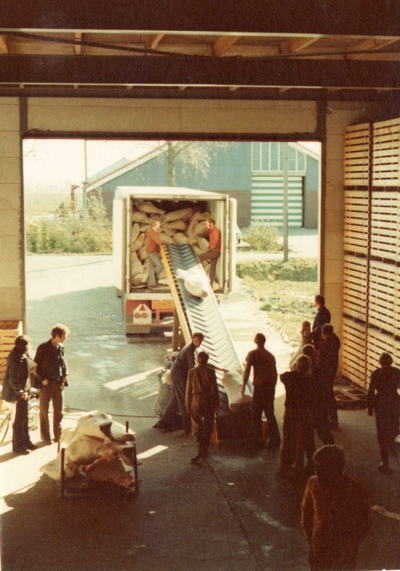
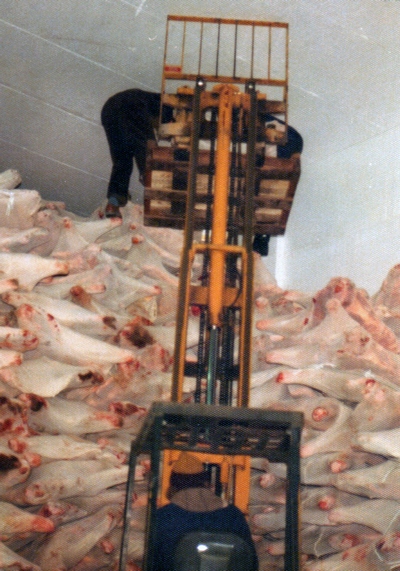
1975
The enormous need for space where Irish beef, among other products, could be stored for a long time led to the first major expansion of the Nieuw-Vennep cold store in 1975, two years after it came into operation. Van Elderen did the construction himself again. In the photo below he stands on the future roof.
1978
Van Elderen is able to buy a piece of land in Rotterdam and builds a cold store there with his own construction team. Under the name ‘Eurofrigo’ he competed with the established order in the Maas City. Because of the quality of the service, provided by capable, highly motivated employees who drive from Nieuw-Vennep to Rotterdam every day in a van, more and more large customers are opting for one of Van Elderen’s cold stores. His motto: “A good boss doesn’t sit somewhere at the top, in an ivory tower, but knows exactly what is going on in his business and has an eye for his people.
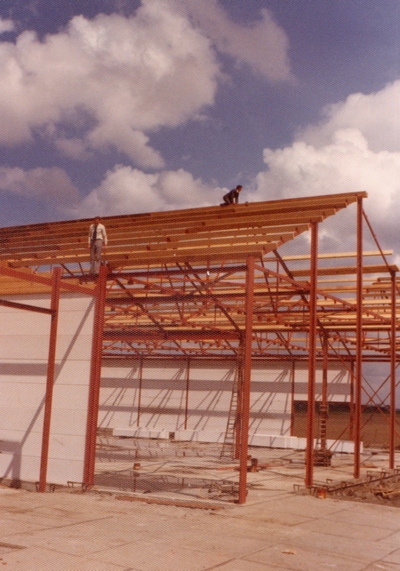
The photos below show brother Gerrit van Elderen (far left in the photo) receiving the steel construction, who is there for him day and night. The photo on the right shows Van Elderen in consultation with two employees from the very beginning, Co Bus and Dan Zwartelé. Thanks in part to these loyal family members and employees, the leap from the Haarlemmermeer polder to the Rotterdam harbour was a success.
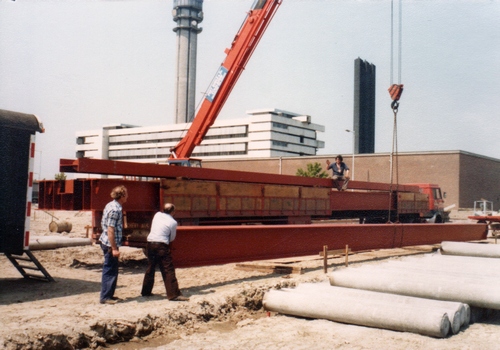
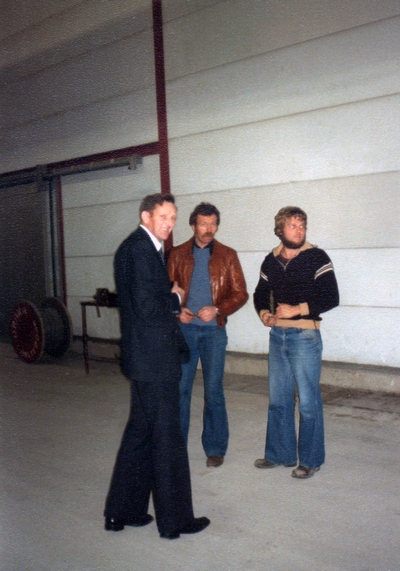
1979
Van Elderen expanded his activities in the ports of Amsterdam and Rotterdam, offering customers, as an extra service, the loading and unloading of ships. He did this labour-intensive work with his own unloading teams. The goods, consisting of fish, meat and chips, are stacked loose in the ships and have to be manually palletised (see right-hand photo below). In the left-hand photo, he and his daughter Wil leave a ship via the gangway. The cargo of the ship consists of boxes of frozen potato products from McCain in Canada.
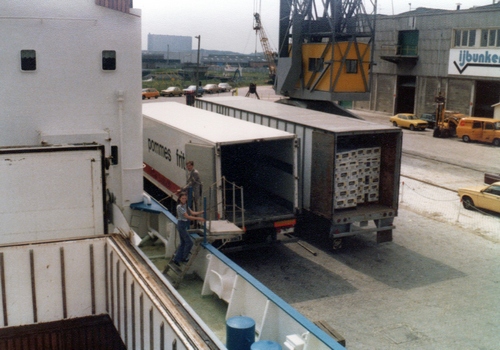
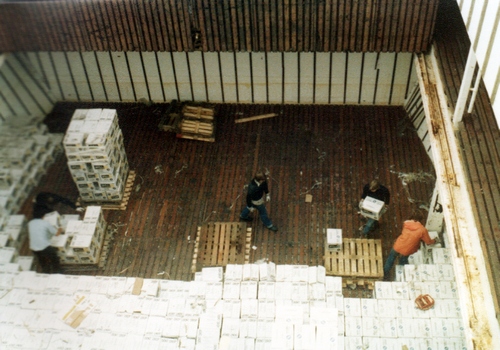
1982
The cold store in Rotterdam is also a success, so that it soon needs to be expanded. In 1982 Koelveem Diepvries NV, the neighbour and competitor, was also taken over.
1983
Roerstreek’ is the name of the cold store built by Van Elderen’s construction team in Roermond. He now has several major customers in the potato processing industry. That makes him happy, because: “I have something to do with arable farming. In fact, I have always been a farmer.
It is with pain in his heart that Van Elderen puts an end to growing celeriac and beetroot. He can no longer combine large-scale horticulture with the many activities in the well-run cold stores in Nieuw-Vennep, Rotterdam and Roermond. The photo on the right shows Van Elderen during the last harvest on his self-developed ‘beet harvester’, with his wife Ank assisting him on the tractor.
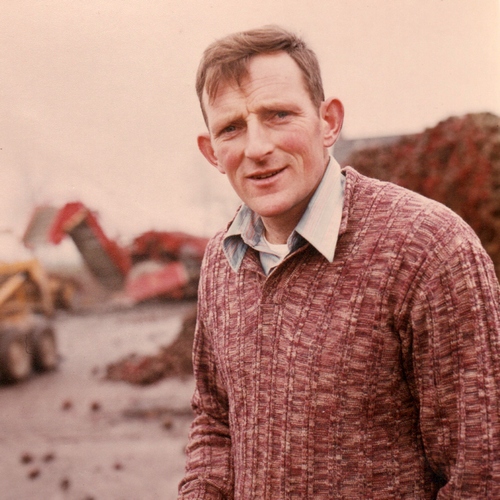
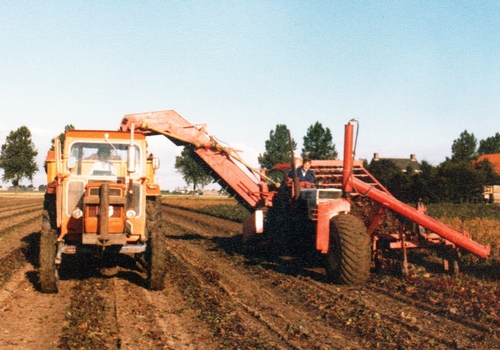
1988
Van Elderen sold the cold stores in Rotterdam and Roermond to the Japanese multinational Nichirei Corporation Tokyo. The reason? “The Japanese company wanted to gain a foothold in Europe and was willing to pay a good price. So why would I hold on to it? Van Elderen is keeping the cold store in Nieuw-Vennep out of the transaction. The Japanese stipulate that he may not undertake any new initiatives in the storage of temperature-sensitive products for five years. Van Elderen will stick to it. “An agreement is sacred to me. A man is a man, a word is a word.”
1993
A large potato processing company asks Van Elderen to build a cold store in the east of the country. The choice fell on ‘s Heerenberg. Van Elderen and his construction team are building a new cold store at De Immenhorst industrial estate in the Achterhoek region. Wil van Elderen, the couple’s second oldest daughter, and her husband Henk van Veen will be in charge of the daily operations. Margreet van Elderen, the youngest daughter, is leaving an ever increasing mark on the management of the cold store in Nieuw-Vennep. In the photo below Henk van Veen poses with his daughter Géraldine in front of the future cold store in ‘s-Heerenberg.
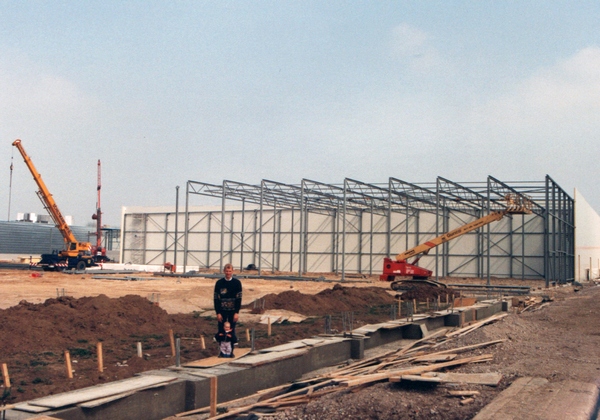
1998
Van Elderen goes international: Cold stores are built in Lommel (Belgium) and Montigny-le-Roi (France) which are fully dedicated to the storage of frozen potato products. Reinier van Elderen, son of the Van Elderen-Parlevliet couple, will be in charge of the daily management. The foreign coldstores continue under the name ‘Frigologix’.
1999
Margreet van Elderen took over the cold store in Nieuw-Vennep, which now had a capacity of 120,000 m3. The name becomes ‘Frigo Nieuw-Vennep’. Also part of the Frigo Group, Frigo ‘s-Heerenberg was taken over by Margreet’s sister, Wil van Elderen, and her husband Henk van Veen. The cold store in the Achterhoek grew steadily to a capacity of 170,000 m3.
2007
The Frigo Group Logistics adds an office to the Frigo Group in Abcoude. From now on, the Frigo Group can offer its customers a total solution in the form of the complete logistic handling of frozen and ambient goods flows. Since all sites have a Warehouse Management System (WMS) with barcode identification, product tracking and tracing is now guaranteed up to collinear level. As an independent service provider, Frigo Group Logistics offers conditioned transport options for both customers who store their products in the Frigo cold stores and for external customers at home and abroad. As a result, the Frigo Group has even more control over the chain and has even more to offer frozen food manufacturers. In the form of logistics processes that are optimised and/or completely taken off our hands, by an experienced and reliable partner with state-of-the-art coldstores and ISO 22000 and IFS certification.
2011
With a new logo and a new internet site, www.frigogroup.com, the Frigo Group gets a new house style. In the spirit of its founder Hein van Elderen and his wife, the family business continues to stand out as a ‘Third Party Logistics Provider’ for both the storage and transport of chilled and frozen foodstuffs, offering a high-quality service.
2015
Conditioned transport remains an integral part of the Frigo Group’s service offering, but the establishment of Frigo Group Transport is a response to market demand for more transport services. With her lorry driving licence in her pocket, Margreet van Elderen adds lustre to the start of the new business unit by driving one of the two lorry combinations from Nieuw-Vennep to ‘s-Heerenberg. Through cooperation with, and later the acquisition of, a transport company in Geldermalsen, Frigo Group Transport is set to grow rapidly. that specialises in conditioned transport. In addition to conditioned transport, the transport of steel and machines is growing into a transport specialism.
2020
The Frigo Group will continue without Frigo ‘s-Heerenberg, which will be sold to Lineage Logistics. The purchase of nine new trucks underlines the growth of Frigo Group Transport within the Frigo Group: the philosophy of being the logistics service provider in frozen foods, with no fewer than 24 truck combinations, is not only applicable to frozen and chilled foods. With steel and machines as specialities, the Frigo Group can take care of the complete logistic handling of all conceivable ambient goods. Frigo Group Transport maintains a daily transport connection with France (especially the regions of Paris, Rouen and Lyon), but the whole of Europe is increasingly emerging as the working area of the logistics service providers from Nieuw-Vennep and Geldermalsen.



